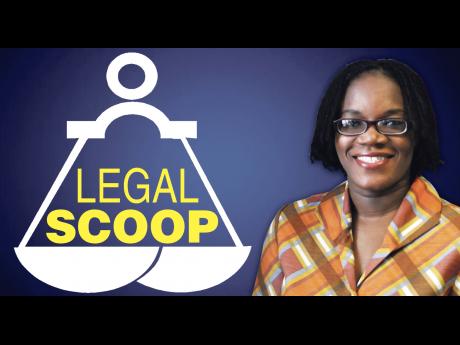Legal Scoop | Hands off, court tells CVM - Ruling provides treasure trove for persons dealing with copyrighted material
Copyright infringement cases are a rarity locally, and it does not help that the Copyright Act in Jamaica is as large as it is unwieldy.
Understandably, therefore, media practitioners, generally, and practitioners in this area of the law, were gushing recently when Justice Bryan Sykes handed down a couple of judgments (and written to boot!) in the copyright infringement case brought by Television Jamaica Ltd (TVJ) against CVM television (CVM) in 2015.
To address the big white elephant in the room before proceeding further, yes, I am substantively employed to the
RJR-Gleaner Group, of which TVJ is a member, and, yes, that connection may have heightened my interest in the rulings, but regardless of affiliation, the judgments are worthy of attention as they add local jurisprudence to an area of the law that is woefully lacking in Jamaica.
BACKGROUND
The genesis of the dispute in the case traces back to 2015 when TVJ commenced legal proceedings against CVM for infringement of its exclusive right to broadcast the IAAF World Athletics Championships then under way in Beijing, China.
At the trial of the substantive issue in June 2016, CVM did not dispute TVJ's ownership of the rights in question or that it had broadcast various aspects of the World Championships, however, it contended that its use of the content constituted "fair dealing" and was, therefore, legal.
LIABILITY
At the first phase of the trial, which, like the second phase, was presided over by Justice Bryan Sykes, various examples of CVM's breach of TVJ's licence were tendered into evidence, and Justice Sykes, in his usual methodical manner, reviewed each to determine whether the defence of fair dealing was indeed available to CVM.
While CVM's defence of "fair dealing" did succeed in some instances (and those, too, constitute an important addition to the jurisprudence), TVJ, as stated by Justice Sykes in his judgement in the second phase of the trial, succeeded in establishing CVM's liability in large measure and was, therefore, entitled to full costs.
SPLIT TRIAL
An interesting aspect of the approach adopted in this case was the holding of, in effect, two trials. In the words of Justice Sykes, in the earlier of the two judgments he delivered: "In intellectual property cases it is common for the trial to take place in two stages. The first stage deals with liability, and if there is liability, then the second stage deals with the remedy."
Justice Sykes then went on to set a September date for the second phase of the trial.
DAMAGES & ADDITIONAL DAMAGES
Interestingly, both "Damages and Additional Damages" were awarded to TVJ in this case, notwithstanding the submissions of Queen's Counsel Charles Piper, for CVM, for only nominal damages to be awarded.
In the view of Justice Sykes, the only legitimate way for CVM to have gained access to the material used in its 'Return to the Nest' programme, and in other infringing uses, was by paying for a licence from TVJ.
Having, therefore, considered the expert evidence of Oliver McIntosh, CEO of SportsMax, as to how such licences were priced and marketed in the industry, Justice Sykes then went on to hold that CVM was to pay TVJ US$85,975.00 by way of damages.
The sum in question represented a 50/50 share of the US$172,750.00 cost paid by TVJ for the rights in question and to bring them to Jamaica.
Justice Sykes then went on to award "additional damages" in favour of TVJ.
In Paragraph 51 of the judgment, Justice Sykes states: "Section 32 (2) of the Copyright Act, permits an award of additional damages having regard to (a) the benefit accruing to the defendant; (b) the flagrancy of the infringement and (c) all other material considerations. It is this court's considered opinion that additional damages are in order. The conduct of CVM can properly be described as deliberate and calculated risk taking." [emphasis added]
In the view of Justice Sykes, CVM's breach of TVJ's rights in the World Championships programme went beyond a mere breach. It was flagrant.
The words of Sykes at Paragraph 65 of the said judgment are particularly strident:
"The Return to the Nest programme made no pretence at reporting current events. It was not a news programme. It was an audacious taking and using of exclusive licence-protected material, which continued despite verbal and written complaints from TVJ ... . It was deliberate, calculated risk taking. There was no deceit. There was no dishonesty. Nonetheless, the breach was flagrant. [emphasis added]
Having determined that CVM's breach was flagrant, Justice Sykes, therefore, went on to award US$40,000.00 in additional damages to TVJ.
COSTS
Georgia Gibson Henlin, Queens Counsel, who represented TVJ, also persuaded the court with her submissions on costs.
Although TVJ had not succeeded in every single instance of breach claimed, Gibson-Henlin argued that there should be no deduction of costs for failure on some issues, but rather, that full costs should be awarded to TVJ since it had won "the lion's share" of the issues and was the party that had been ruled entitled to damages.
While Justice Sykes agreed with Henlin-Gibson that TVJ was entitled to full costs, he fell just short of ordering same as the judge ruled that an additional day had been added to the second phase of the trial because TVJ had failed to organise itself in a particular instance.
While CVM has appealed the judgments, the case represents a treasure trove for media practitioners, intellectual property lawyers, and generally, for anyone who republishes copyrighted material.
Kudos to Justice Sykes for his industry in concluding the two phases of the trial quickly and delivering written judgments.
- Shena Stubbs is an attorney-at-law and legal commentator. Send feedback to shena.stubbs@gleanerjm.com Twitter:@shenastubbs




